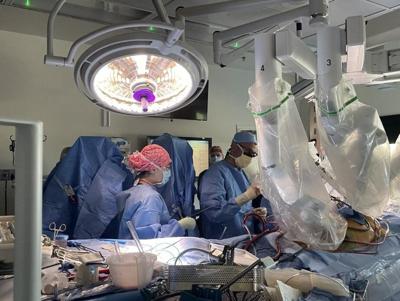Dartmouth Hitchcock Medical Center (DHMC) in Lebanon, New Hampshire, has become the first hospital on the East Coast, north of Boston, to perform minimally invasive mitral valve surgery using a surgical robot. This groundbreaking procedure began on August 15, 2023, marking a significant advancement in cardiac surgery technology.
The mitral valve plays a crucial role in heart function by connecting the upper and lower chambers on the left side of the heart. When conditions such as mitral valve prolapse lead to severe leakage, surgical repair becomes vital to prevent permanent heart damage. Although replacing the valve with an animal valve is an option, surgical repair is often the preferred treatment method. Success rates for mitral valve repair vary across hospitals, with national estimates ranging from 60% to 70%.
Advancements in Robotic Surgery
Dr. Henry J. Tannous, FACS, the section chief of cardiac surgery at DHMC’s Heart and Vascular Center, stated, “We are one of the top academic medical centers in the United States for mitral valve repair, with a success rate greater than 95% in repairing degenerative mitral valve disease.” The introduction of robotic assistance enhances this already impressive success rate.
The surgical robot, which has been in development for the past two decades, has only gained popularity among patients in recent years. To prepare for its use, Dr. Tannous and his cardiac surgery team dedicated a full year to training, observing procedures at leading academic centers in Atlanta, Manhattan, and Los Angeles. The timing of the robot’s launch coincided with the arrival of Dr. Jose R. Rodriguez, a skilled cardiac surgeon who had experience using the robot in his previous position.
“The fact that we had the whole team getting ready before his arrival made Dr. Rodriguez an ideal match,” Dr. Tannous explained. His previous experience with the robot at Stony Brook University Hospital on Long Island contributed to a seamless integration into DHMC’s surgical practices. “When the day of the first surgery arrived, it was like business as usual.”
Successful Outcomes and Future Prospects
The first patient to undergo robot-assisted mitral valve repair is now recovering at home, as is a second patient who had the procedure performed on August 18, 2023. Dr. Tannous reported that two additional surgeries are scheduled for September, with expectations for more to follow.
Dr. Tannous emphasized the importance of a collaborative team approach in the surgical process, stating, “The robot is a very fancy tool, but it can’t do the surgery or teach us how to repair a valve. It allows us to do a better job, which leads to better outcomes for patients.”
Currently, the robot is utilized exclusively for mitral valve repairs, but there are plans to expand its use to assist in other cardiac surgeries. “Robotic surgery is less invasive, allows for less time spent in the hospital, and fosters faster recovery,” Dr. Tannous noted. “This is a procedure that patients are willing to travel long distances for. We’re thrilled to be able to offer it to patients in our region and beyond, without the need to go to a major city out of state.”
The introduction of robotic technology at DHMC not only enhances surgical precision but also represents a significant leap forward in cardiac care, promising improved patient outcomes and wider accessibility to innovative treatments.
